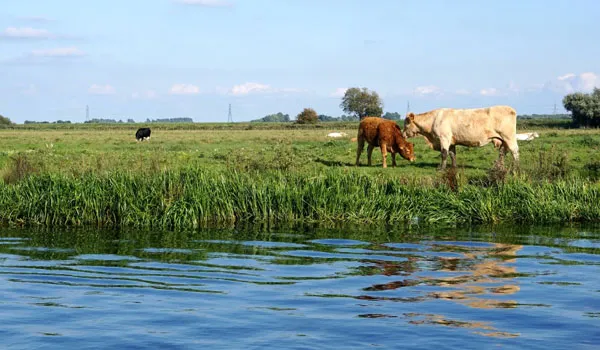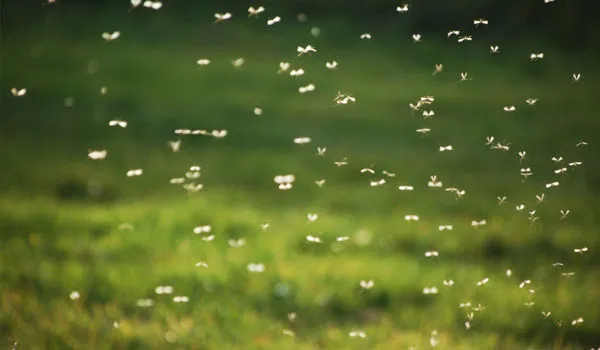Here, entomologist and writer, Richard Jones, explains all you need to know about mosquitoes and the zika virus.
1. How many species of mosquito occur in the UK and where are they most common?
The UK checklist of mosquitoes has 33 species, but five are so rare they may be extinct or were never really ever established here in the first place.
They are most common in fens and marshy areas, where there are plenty of ponds, pools, ditches and other stagnant or slow-moving water bodies, in which the aquatic larvae live. However, since they can breed in garden ponds, ruts, puddles and discarded tin cans and plastic containers, they can occur anywhere.

2. Why do mozzies bite and how do they do it?
Only female mosquitoes bite, they need the extra nutritional boost from protein-rich mammalian blood to mature their eggs. They take a blood meal before laying each egg batch.
Mosquitoes, like all flies, have sucking rather than biting mouthparts. Houseflies have soft sponge-like ‘tongues’, but mosquito mouthparts are long, sharp stylets. An outer flexible sheath splits open at the front and is folded back, allowing six close-fitting rapier-sharp components to be inserted into the skin. Four of these (two mandibles and two maxillae, in entomological jargon) are saw-toothed at the tips and rapid to-and-for movements of these cut into the dermis. The fifth piece of the mouthparts injects saliva, to stop the blood clotting in the mosquito’s mouthparts. Blood is then sucked up through the tube-like sixth element.
3. How bad is their bite?
Long gantry legs allow a soft landing and the quiet high-pitched wing buzz is almost inaudible so they use the stealth attack mode. The bite is usually undetectable. A mosquito needs about 2-3 minutes to take its fill of 1–5 mg (0.001–0.005 ml) of blood. It is the reaction to injected saliva, after the mosquito has left which causes the irritation. Some people are particularly allergic and come up in a painful lump the size of half a pingpong ball. Others just get a small itchy spot which soon subsides.
4. Can British mosquitoes spread malaria or zika virus?
British species of Anopheles mosquito can and did transmit malaria right up until the end of the 19th century. Called ague, it was the less potent Plasmodium vivax form of the disease, which kills 1-2% of severe untreated infections. The more potent P. falciparum (25-50% mortality in severe untreated cases) only occurs in tropical areas. There was an outbreak of P. vivax malaria in the north Kent marshes in 1917-1921 when soldiers returning from malaria-endemic countries brought the disease back to the rehabilitation camps there. It was soon picked up by local mosquitoes and 491 cases of malaria were found in the local population, mainly children playing out of doors. A similar, smaller, outbreak occurred after world war 2. Both outbreaks were caught and checked by antimalarial drugs.
The key thing here is that to have an outbreak of mosquito-borne disease, you need both host mosquito AND diseased populace from which the flies pick up the disease. At the moment we have potential malaria-carrying mosquitoes here, but no malaria sufferers to be bitten.
Whether UK Aedes mosquitoes could spread zika virus has not yet been determined. To some extent we are sheltered here with our mild temperate climate.
Entomologists and doctors in North and South America, southern Europe and Australia are far more concerned. The recent world-wide spread of the highly aggressive Aedes albopictus (a mosquito species native to east Asia) has led to serious concerns over West Nile virus, dengue, and other debilitating often fatal diseases, and this insect may become a key vector for zika. It has not yet been found in Britain, but is widespread in North America, Europe and is at the outlying islands north of Australia.
5. When is peak mosquito season?
Although they are around almost all year, it is in summer that they reach peak numbers. This is partly because they breed faster in warm weather, so populations explode, and partly because we notice them since humans are out and about, with their shirts off, in summer.

6. What ecological role do mosquitoes play in the UK?
The aquatic larvae of mosquitoes are scavengers, feeding on microscopic algae and decay particles. They, and the adults, are eaten by many predators, so are part of the nutrient recycling at the centre of the food web. In near-Arctic Canada, male mosquitoes (which drink nectar, not mammalian blood) have been found pollinating rare and obscure tundra orchids.
7. How can you avoid being bitten by mozzies?
Physical barriers like mesh screens over windows will keep them from coming indoors. Bed-nets work well if travelling to warmer climes. Light long-sleeved shirts and light long trousers are better than tee-shirt and shorts.
Deet (N,N-diethyl-meta-toluamide) is about the only repellent proved to work, but this is only a deterrent to the mosquitoes, not an absolute barrier. Essential oils, burning incense, smoking coils or electronic buzzers are of questionable efficacy.
8. How can you stop mosquitoes breeding in your wildlife pond/water butt etc?
You can’t, unless you completely poison the water and kill everything. Better to try and achieve a balanced ecosystem, with varied wildlife, including amphibians, water beetles, boatmen, dragon- and damsel-flies and other insects. These are predators, and will help keep the larvae of mosquitoes and other flies in check.
Richard Jones is an entomologist and writer. His book Mosquito, in the acclaimed Animal series was published by Reaktion Books in 2012. He is currently working on Dung — a natural history.
